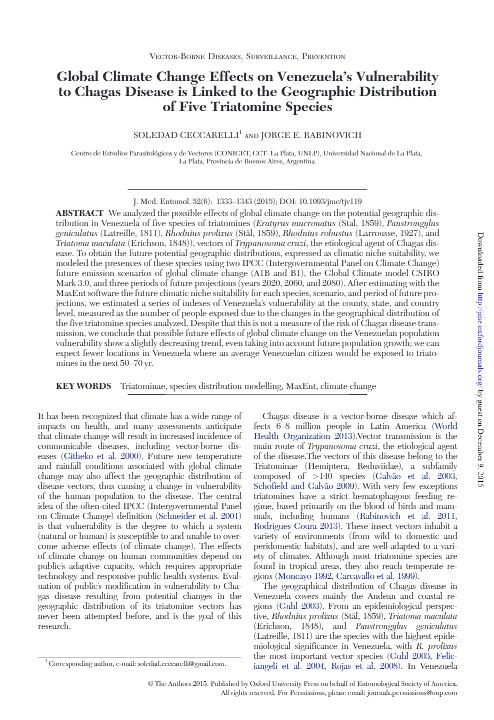Artículo
Global climate change effects on Venezuela´s vulnerability to Chagas Disease is linked to the geographic distribution of five Triatomine Species
Fecha de publicación:
08/2015
Editorial:
Entomological Society Of America
Revista:
Journal Of Medical Entomology
ISSN:
0022-2585
e-ISSN:
1938-2928
Idioma:
Inglés
Tipo de recurso:
Artículo publicado
Clasificación temática:
Resumen
We analyzed the possible effects of global climate change on the potential geographic distribution in Venezuela of five species of triatomines (Eratyrus mucronatus (Stal, 1859), Panstrongylus geniculatus (Latreille, 1811), Rhodnius prolixus (Sta° l, 1859), Rhodnius robustus (Larrousse, 1927), and Triatoma maculata (Erichson, 1848)), vectors of Trypanosoma cruzi, the etiological agent of Chagas disease. To obtain the future potential geographic distributions, expressed as climatic niche suitability, we modeled the presences of these species using two IPCC (Intergovernmental Panel on Climate Change) future emission scenarios of global climate change (A1B and B1), the Global Climate model CSIRO Mark 3.0, and three periods of future projections (years 2020, 2060, and 2080). After estimating with the MaxEnt software the future climatic niche suitability for each species, scenario, and period of future projections, we estimated a series of indexes of Venezuela's vulnerability at the county, state, and country level, measured as the number of people exposed due to the changes in the geographical distribution of the five triatomine species analyzed. Despite that this is not a measure of the risk of Chagas disease transmission, we conclude that possible future effects of global climate change on the Venezuelan population vulnerability show a slightly decreasing trend, even taking into account future population growth; we can expect fewer locations in Venezuela where an average Venezuelan citizen would be exposed to triatomines in the next 50–70 yr.
Palabras clave:
Triatominae
,
Species Distribution Modelling
,
Maxent
,
Climate Change
Archivos asociados
Licencia
Identificadores
Colecciones
Articulos(CEPAVE)
Articulos de CENTRO DE EST.PARASITOL.Y DE VECTORES (I)
Articulos de CENTRO DE EST.PARASITOL.Y DE VECTORES (I)
Citación
Ceccarelli, Soledad; Rabinovich, Jorge Eduardo; Global climate change effects on Venezuela´s vulnerability to Chagas Disease is linked to the geographic distribution of five Triatomine Species; Entomological Society Of America; Journal Of Medical Entomology; 52; 6; 8-2015; 1333-1343
Compartir
Altmétricas




